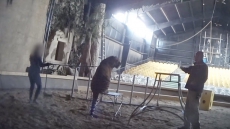WHITEHORSE — A Yukon coroner's report has found a bullet, not a bear, killed a woman who was being attacked by a grizzly near Johnsons Crossing, 120 kilometres southeast of Whitehorse.
It began when a bear pushed out the front window at Claudia Huber's home in October 2014, then chased her and her husband Matthias Liniger around their living room.
Chief Coroner Kirsten Macdonald said in her report that the pair was forced out of the house, and ended up hiding in separate vehicles. When Huber made a break for the other vehicle, the bear attacked and dragged her into the woods.
"The bear was acting in a predatory manner, likely considering the family dog as potential prey," the report said.
"The bear likely switched his focus from the dog to Ms. Huber as she exited the vehicle."
Macdonald's report said the bear was jumping on the hood of the SUV where Huber was hiding. When the animal started to run away, she tried to reach the other vehicle where her husband was hiding because she had the keys for the ignition. The bear quickly turned around and caught her.
By the time Liniger returned with a rifle, the bear had dragged Huber 20 metres across a creek and was standing on top of her when Liniger fired several rounds. It didn't die and Liniger had to return to the house to get more ammunition before finally killing the bear.
One of those shots deflected from a nearby tree and hit Huber in the chest, killing her, the report concluded.
Macdonald said the attack shows that more education is needed, both to reduce human food accessible by bears and to teach people how to deal with different types of bear encounters.
She said school children should be taught how to interpret bear behaviour and what actions should be taken depending on that conduct. Huber played dead, the report noted, one of many suggested responses in a bear attack.
"However, because the attack on Ms. Huber was predatory in nature, it unfortunately wasn't the correct response in this incident. A predatory attack requires the victim to fight back against the bear."
The male bear was estimated to be 38 years old and weighed 170 kilograms. A necropsy later showed it was in poor condition, but not emaciated. There was no evidence of underlying disease, which sometimes explains uncharacteristic predatory behaviour.
The necropsy also found a poker chip stuck to its fur. Investigators later discovered the same bear had ransacked a local hunting camp about 24 km from the Huber home, where the animal found a significant amount of human food.
A container of glue and poker chips matching the one stuck to the bear were found spread around the cabin.
The report said those who own cabins and rural properties need to be aware of what can happen if food is available to animals.
"Education regarding closing camps up for the season and the importance of removing attractants both inside and outside cabins is needed."



